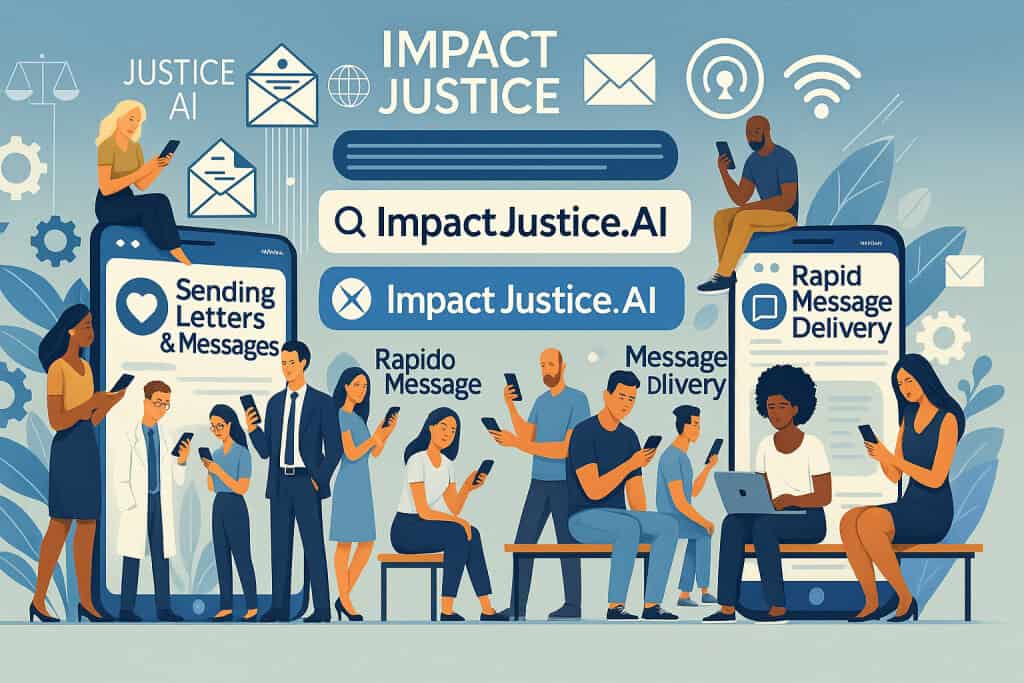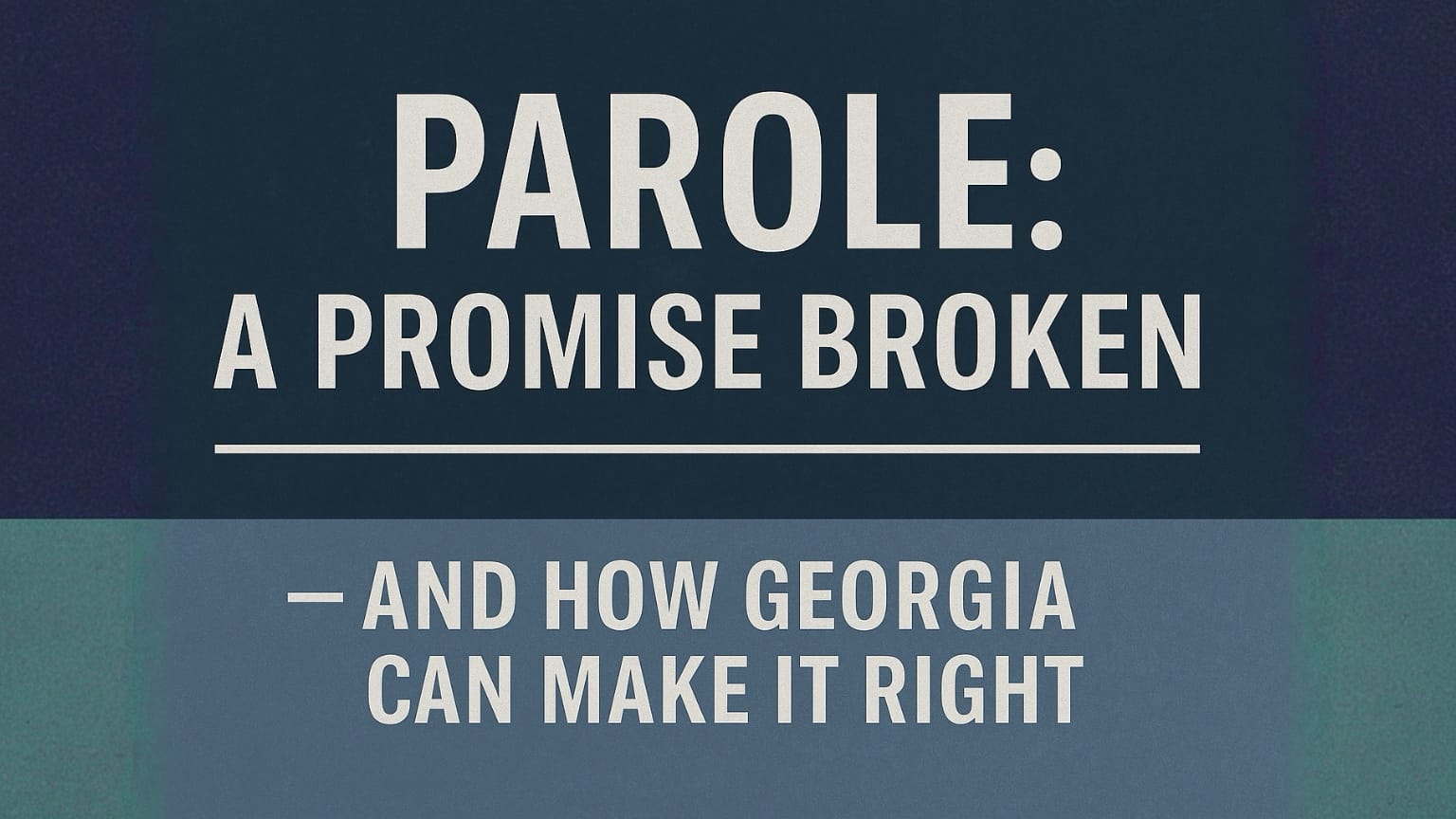A Family’s Waiting Game
Every day across Georgia, mothers sit by phones that don’t ring, wives count down to parole dates that never come, and children ask the hardest question of all: “When is Daddy coming home?”
Families cling to hope while the Parole Board remains silent. Decisions arrive months or years late—or not at all. For too many, the process feels rigged against rehabilitation.
But parole was never meant to be a guessing game. It was meant to be a contract of trust—a way for the state and its citizens to agree that people can change, and that punishment must have a purpose beyond pain.
A Promise Unkept
Parole was supposed to be Georgia’s promise — a fair exchange between rehabilitation and release, between accountability and trust. But that promise has been broken. Families wait years beyond eligibility, hearings are delayed without explanation, and those who have done everything right remain trapped in a system that no longer honors redemption.
For thousands of families, parole isn’t just a policy — it’s a lifeline. And every day it’s denied without reason, that lifeline frays a little more.
What Parole Really Means
Parole isn’t mercy. It’s management.
It’s society saying: “If you prove you’re ready, we’ll prove we believe in redemption.”
It trades blind incarceration for structured accountability—a supervised return to community life that saves taxpayers money and makes the public safer.
Georgia’s own data proves it.
Over 72% of parolees never return to prison—a success rate that outperforms probation, private prisons, and endless incarceration. Yet thousands who have already served their time wait years past eligibility, locked in overcrowded, violent prisons that the U.S. Department of Justice has called “lethally negligent.”
When trust breaks down, the system fails everyone: taxpayers, communities, and the human beings trapped inside.
Risk. Redemption. Reciprocity.
Parole works when three things work together:
- Risk: The Board assesses it fairly, using evidence—not emotion or politics.
- Redemption: The incarcerated person proves accountability through clean records, education, and growth.
- Reciprocity: The state keeps its promise—reviewing cases on time, explaining decisions, and providing clear paths home.
This is the unspoken deal families depend on.
When the Board refuses to communicate, or delays hearings for years, it doesn’t just break procedure—it breaks lives.
“We Thought He’d Come Home”
“I got a letter saying my son had a parole date coming up. We started saving for his bus ticket,” recalls Lisa, a mother from Savannah. “Then… nothing. Months passed. His counselor said they didn’t know why it was delayed. That was two years ago.”
Stories like Lisa’s echo across Georgia. Delays, arbitrary denials, and lack of written reasons are not exceptions—they’re the rule. Families lose hope not because their loved ones failed, but because the system won’t keep its word.
A Smarter Way Forward
Parole reform isn’t about being soft on crime. It’s about being smart on justice.
Here’s what must change:
1. Presumptive Parole: Release should be expected at eligibility unless there’s clear evidence of danger.
2. Mandatory Written Decisions: Families deserve explanations, not silence.
3. Timely Hearings: No more waiting years for paperwork.
4. Elderly & Medical Review: Compassionate release should be the norm, not the exception.
5. Transparency & Oversight: Publish grant rates, delays, and outcomes. Trust grows from sunlight.
6. Community Support: Connect returning citizens to jobs, housing, and treatment—because supervision without support is just another setup for failure.
These steps don’t weaken safety—they strengthen it, by turning rehabilitation into prevention.
For Families, It’s Personal
To every mother, sister, and spouse waiting for a name on that release list: you are not alone.
Your voice matters. Every call, letter, and email adds weight to the cause.
Parole is not a privilege—it’s a right earned through effort, discipline, and change.
And when the state ignores that, it isn’t protecting Georgia—it’s betraying its own values.
What You Can Do
Join GPS and our partners at ImpactJustice.ai to help families send personalized emails to legislators and Parole Board members demanding reform.

Tell them Georgia’s families deserve a Second Chance Parole Reform Act—one that honors progress, restores fairness, and rebuilds trust.
Closing Thought
Parole is the promise that people can grow. When the state breaks that promise, it tells every prisoner—and every child waiting at home—that change doesn’t matter.
But we know better.
Because every story of survival, every lesson learned behind bars, and every family that refuses to give up is proof of what Georgia’s justice system has forgotten:
Parole isn’t mercy—it’s a promise. And promises must be kept.
Read more about what parole should be and how Georgia can fix this broken system:
A Second Chance for Georgia: Fixing Parole With the Reform It Desperately Needs


Parole is much more than mentioned above, The promise of parole is Hope! Hope of a second chance is so important to an inmate and their well being yet so many inmates receive sentences with no hope of parole. GA. reform needs to include the elimination of ” no parole” crimes. Place an inmate in prison with no hope or opportunity is never a winning formula. Another opportunity that GA can make right.